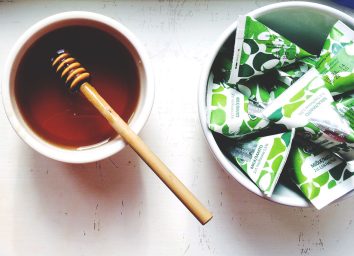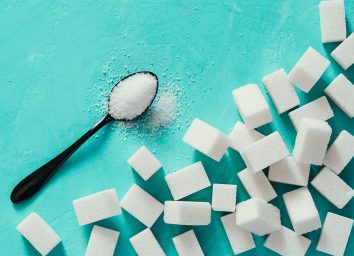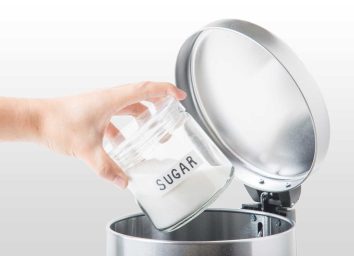How Much Added Sugar Should You Limit Yourself to a Day?

More and more people are becoming aware that limiting sugar intake is important for sustaining overall health. Thankfully, keeping track of our sugar consumption is getting easier than ever due to the FDA's labeling guidelines for added sugar.
While food labeling can help people know how much added sugar they're consuming, a nutrition label is only as useful as people's understanding of what it means. Here's an overview of what added sugar is, the downsides of eating too much sugar, and what a healthy limit for added sugar might look like.
What is added sugar?
"Added sugar is sugar that is not naturally occurring in a food, but is added during its production and processing to enhance flavor and texture," says Lisa Samuels, RD, founder of The Happie House.
Canned fruit is a classic example of added sugar, says Toby Smithson, MS, RDN, LD, CDE, founder of DiabetesEveryDay.com and author of Diabetes Meal Planning and Nutrition for Dummies. A plain peach wouldn't contain any added sugars, though it does contain sugar. But if you take that same peach and store it in syrup, that food product would contain added sugars within the syrup.
Per Smithson, other common foods that contain added sugar include:
- Fruit juices
- Soft drinks
- Energy drinks
- Sweets such as candy, cakes, and cookies
Are added sugars unhealthy?
Just because added sugars are distinguished from naturally occurring sugars on a nutrition label, that doesn't necessarily mean they're "unnatural."
"A lot of added sugars come from natural sources," says Maxine Yeung, MS, RD, CPT, and founder of The Wellness Whisk.
Common sources of added sugar include:
- Agave syrup
- Brown sugar
- Cane sugar
- Corn syrup
- Dextrose
- Fructose
- Honey
- Molasses
"Even though some sugars, such as honey, occur naturally, they are consumed by adding it to other foods or beverages, and are therefore considered added sugars," Yeung says.
But when it comes to whether added sugars are healthy, it's best to compare them to natural, whole food sources of sugar. Samuels explains that whole food sources of healthy sugar, like fruit, "also contain fiber, vitamins, and minerals [in addition to the sugar], which gives them a greater nutritional value than foods with added sugar."
And while foods with natural sugars are healthier than isolated added sugars, just because a food has added sugar doesn't make it unhealthy; rather, it's more important to look at the quantity of added sugar in a food.
What are the downsides of eating too much sugar?
No matter the source, too much of any kind of sugar can be bad for your health.
"The worry with added sugar in food and beverage items is that too much sugar in your diet can increase your risk for many medical complications, such as dental cavities, pre-diabetes, diabetes, and high cholesterol," Yeung says.
"Sugar contains calories but little to no nutritional value; it contributes what we call 'empty calories' to our diet," says Samuels. "This means that it can cause us to gain weight without adding any nutritional value for our bodies. It also leaves less room for healthier foods in our diet."
Per Samuels, sugar can also provoke inflammation and "increases the risk of developing certain chronic conditions such as heart disease, depression, kidney and liver disease, and certain cancers."
Excess sugar consumption can be especially concerning for people with conditions such as high blood pressure or diabetes. Smithson says too much sugar can raise triglyceride levels or increase the carbohydrate content in the diet of a person with diabetes.
How many grams of added sugar should you eat per day?
Okay, so eating too much added sugar isn't good for you. But what qualifies as "too much" and what should your daily sugar intake be?
The answer may not be one-size-fits-all.
"The FDA and most recent dietary guidelines […] recommend that added sugars make up no more than 10 percent of your daily calories," Yeung says. "This amount varies per person based on individual calorie needs."
Yeung says that as a general rule, a person eating 2,000 calories per day should consume no more than 50 grams of added sugar daily. "For a person who needs [fewer] calories, the maximum amount of added sugar is [fewer] grams per day," she says.
Examples of recommended sugar intake for different caloric diet are:
1,200 calories: 30 grams added sugar
1,500 calories: 37 grams added sugar
1,800 calories: 45 grams added sugar
2,000 calories: 50 grams added sugar
2,200 calories: 55 grams added sugar
2,500 calories: 62 grams added sugar
While the FDA's recommendations are meant for the general public, these guidelines may be different for people with special health considerations.
For example, Smithson says, "AHA (American Heart Association) offers guidelines for people with heart disease." Those guidelines set the recommended limit for added sugar at 25 grams per day.
Smithson says recommendations also vary for people with diabetes. "There may be times that they require added sugar," she says.
What's the most practical daily added sugar intake?
If your head is starting to swim, Yeung offers some practical advice for folks without special health considerations. "I recommend trying to limit added sugar as best as you can by focusing on eating a diet primarily made up of whole foods and foods that have been minimally manipulated," she says. "You do not need to avoid all added sugar, and it's perfectly fine to enjoy a sweet sometimes."
And while aiming for a maximum of 50 grams of sugar per day is a decent guideline, less sugar is obviously better—50 grams isn't something to shoot for; it's a limit to stay well under.
"While the FDA makes sure food is safe for human consumption, they are also concerned with putting out products that taste good and have a normal mouthfeel, so they might allow for that extra bit of sugar to keep consumers happy," Samuels says.
Carbs, including sugar, are the main energy source of the human diet. And while technically your body can function without any dietary carbs as long as you consume an adequate amount of protein and fat, your goal shouldn't be to eliminate every scrap of sugar from your diet. Instead, it's important to think about the food sources from which you obtain it.
"I recommend that most of the sugar you consume comes from foods that naturally contain it… where you also get additional nutrients," Yeung says. "For instance, fresh or frozen fruit is a great way to sweeten up a dish; plus you get fiber, water, and various vitamins and minerals," which gives whole food sources of sugar a greater nutritional value than just added sugar.
Some of the best sources of natural sugar to focus on for your daily sugar intake include:
- Vegetables (Root vegetables such as carrots, squash, potatoes, sweet potatoes, and parsnips)
- Dairy products (Greek yogurt, kefir)
- Fruit (berries, apples, bananas)
Above all, Samuels stresses that it's important to listen to your body. "It is difficult to tell… people exactly what to eat, because everyone's bodies are different and they do not process things in the same way," she says. "However, the less added sugar you include in your diet, the better."








